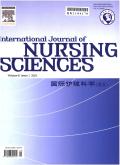Effectiveness of a theory-based tailored individual and family self-management education in adults with uncontrolled diabetes: A randomized controlled trial
IF 3.1
3区 医学
Q1 NURSING
引用次数: 0
Abstract
Objectives
This study aimed to determine the effectiveness of an individual and family self-management (IFSM) education program on triglyceride-glucose (TyG) index, self-management, and diabetes distress among adults with uncontrolled diabetes mellitus type 2 (T2DM).
Methods
A multicentre randomized controlled trial was employed. The study included 68 dyads (adults with uncontrolled T2DM and one family member) that were randomly allocated to the intervention (n = 34) and control groups (n = 34) from March to September 2024. Participants in the intervention group received an 8-week IFSM education program, whereas those in the control group received standard routine care. An automated hematology analyzer XP-100 was used to evaluate triglyceride and fasting blood glucose levels. The Diabetes Distress Scale and Diabetes Self-Management Questionnaire were used to measure diabetes distress and self-management, respectively.
Results
A total of 67 participants completed the intervention. The generalized estimating equation demonstrated a significant interaction between group and time. The IFSM education intervention group had a higher diabetes self-management (β = 16.68; 95 %CI = 15.23, 18.09; P < 0.001), lower diabetes distress (β = −30.74; 95 %CI = −32.57, −28.90; P < 0.001), and lower TyG index (β = −1.97; 95 %CI = −2.41, −1.53; P < 0.001) than the control group.
Conclusions
The findings documented the capacity of IFSM education to reduce TyG and diabetes distress, which could potentially escalate diabetes self-management among individuals with T2DM.
一项基于理论的个人和家庭自我管理教育对未控制糖尿病成人的有效性:一项随机对照试验
目的本研究旨在确定个人和家庭自我管理(IFSM)教育计划对未控制的2型糖尿病(T2DM)成人甘油三酯-葡萄糖(TyG)指数、自我管理和糖尿病困扰的有效性。方法采用多中心随机对照试验。该研究包括68对夫妇(未控制T2DM的成年人和一名家庭成员),于2024年3月至9月随机分配到干预组(n = 34)和对照组(n = 34)。干预组接受为期8周的IFSM教育计划,而对照组接受标准的常规护理。使用全自动血液学分析仪XP-100评估甘油三酯和空腹血糖水平。采用糖尿病困扰量表和糖尿病自我管理问卷分别测量糖尿病困扰和自我管理。结果共有67名参与者完成了干预。广义估计方程表明群体与时间之间存在显著的交互作用。IFSM教育干预组糖尿病自我管理水平较高(β = 16.68;95% ci = 15.23, 18.09;P & lt;0.001),较低的糖尿病窘迫(β = - 30.74;95% ci =−32.57,−28.90;P & lt;0.001), TyG指数较低(β = - 1.97;95% ci =−2.41,−1.53;P & lt;0.001),高于对照组。结论:研究结果证明了IFSM教育能够减少TyG和糖尿病困扰,这可能会提高T2DM患者的糖尿病自我管理水平。
本文章由计算机程序翻译,如有差异,请以英文原文为准。
求助全文
约1分钟内获得全文
求助全文
来源期刊

International Journal of Nursing Sciences
Nursing-Nursing (all)
CiteScore
6.10
自引率
2.60%
发文量
408
审稿时长
25 days
期刊介绍:
This journal aims to promote excellence in nursing and health care through the dissemination of the latest, evidence-based, peer-reviewed clinical information and original research, providing an international platform for exchanging knowledge, research findings and nursing practice experience. This journal covers a wide range of nursing topics such as advanced nursing practice, bio-psychosocial issues related to health, cultural perspectives, lifestyle change as a component of health promotion, chronic disease, including end-of-life care, family care giving. IJNSS publishes four issues per year in Jan/Apr/Jul/Oct. IJNSS intended readership includes practicing nurses in all spheres and at all levels who are committed to advancing practice and professional development on the basis of new knowledge and evidence; managers and senior members of the nursing; nurse educators and nursing students etc. IJNSS seeks to enrich insight into clinical need and the implications for nursing intervention and models of service delivery. Contributions are welcomed from other health professions on issues that have a direct impact on nursing practice.
 求助内容:
求助内容: 应助结果提醒方式:
应助结果提醒方式:


